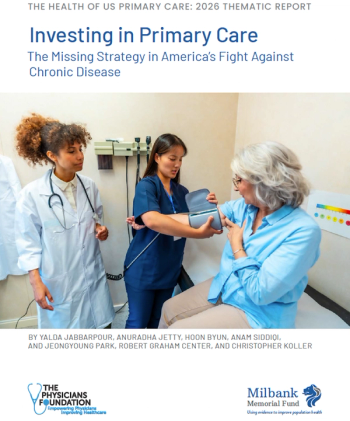
I’m a Democrat physician and I’m voting for Trump
As a long-standing member of the Democratic Party, I have a confession to make. I am voting for Donald Trump. The journey from a man like Obama to a man like Trump was surprisingly short, forged as I started a small independent practice three years ago in the crucible that is healthcare.
Editor’s Note:
Dr. KokaAs a long-standing member of the Democratic Party, I have a confession to make. I am voting for Donald Trump. The journey from a man like Obama to a man like Trump was surprisingly short, forged as I started a small independent practice three years ago in the crucible that is healthcare.
Related:
Current times mandate that I first dispense with the incoherent and tired case made to disqualify Trump as a racist, misogynist, xenophobe who is a harbinger of the apocalypse. We have come to live in an age where dissent from a very narrow norm validated by an equally narrow band of liberal elites is not to be tolerated. Dissenting opinion is vilified and deemed offensive. Saying all lives matter makes you are a racist. Arguing for more restrictive immigration makes you a xenophobe. So yes, I have trouble digesting that Donald Trump, the socially liberal, Elton John-loving recent Democrat will threaten democracy, the republic, or civilization as has been solemnly warned.
Hyperbolic threats to the republic aside, a very concrete threat to medicine exists in the form of well-intentioned administrators trying desperately to save medicine from its physicians. Sachin Jain, M.D., the former senior adviser to the Obama-appointed administrator of the Centers for Medicare & Medicaid Services (CMS), Harvard Medical School alum and current rising star in healthcare delivery
“The simple image of the physician-patient relationship that draws many of us to medicine – the dedicated physician, the thankful patient-is no longer.”
Is it any surprise, then, that the innovation that has emerged over the last eight years relates to the physician as data-entry clerk, reporting on quality metrics that do not relate to actual value?
Did you see this?
The patchwork of payment schemes is now to be replaced by the Medicare Access and CHIP Reauthorization Act of 2015 (MACRA) which in turn took the place of the prior flawed Bill Clinton-era Medicare Sustainable Growth Rate (SGR). The MACRA proposed rule has been panned almost universally by the practicing physician community due to its immense complexity. Stunningly, the messiah who was supposed to solve the healthcare cost conundrum, Barack Obama, weakly mustered a plan to reduce physician reimbursement, yet left untouched the monthly mortgage that hospitals can charge the uninsured for a pack of Band-Aids.
As a result of avoiding the pesky cost issue, the Affordable Care Act (ACA) expanded coverage effectively but costs a pretty penny to the government in the form of federal subsidies, and to the average patient in the form of high deductibles and ever-increasing premiums. The higher non-deductible cost to patients is by design as it is intended to turn patients into bargain shoppers who would, in an ideal world, exert downward pressure on healthcare costs. Unfortunately, the gentleman with the dissecting aorta for some reason does not appear to be in the best position to bargain when he needs surgery.
It is into this morass that Trump steps with healthcare bullets that promise, at the very least, to attempt to move us off the current trajectory. Concrete details about his plans are unknown, but this is likely an asset in this highly polarized political climate that seeks policy piñatas to tear down. No better recent example exists than the ill-fated John McCain campaign healthcare proposal of 2008 to eliminate the tax-free status of employer-based healthcare plans. Candidate Obama then ran a $100 million ad campaign that decried “taxing healthcare benefits for the first time” while ”drug and insurance company profits” continued to rise.
On the other side of the aisle:
Of course, President Obama then proceeded to disallow payments for Obamacare plans by individuals to be tax-free, and thus went ahead and ”taxed” millions. He also proposed an actual tax of 40% on all health plans that dared to offer Cadillac, everything-is-covered benefits. The result, as intended, was more plans that shifted costs to the consumer. While consumers felt the shift in healthcare costs, a rigged marketplace has ensured drug and insurance company profits continue unabated.
Analyzing the Trump healthcare platform
With this context in mind, analysis of some of the major points of a Trump healthcare plan offer some rays of hope:
Repeal and replace the ACA
The ACA has become congeries of policies and acronyms that cover more people with a lot of money, yet does nothing to bend the healthcare cost curve. Repealing it at this point is addition by subtraction. The recently proposed Republican healthcare plan is a reasonable starting point in the discussion of how to replace the ACA.
Allow individuals to deduct health insurance premiums
The ACA does not allow this and thus shifts costs to those who can ill afford to pay post tax premiums.
Related:
Expand health savings accounts
Supporting the use of health savings accounts (HSAs) combined with high-deductible plans is just what the fledgling direct primary care (DPC) movement needs. While direct primary care is not directly mentioned by Trump, he is uniquely free from the usual large industry lobbying efforts that typically sink good legislation. My hope is he would clarify language with regards to using HSAs to directly pay physicians-a privilege currently afforded chiropractors and acupuncturists, but not physicians. The ACA appears to be one of
Affirm the right of all citizens to have healthcare
Trump has bucked the usual Republican Party ideology to affirm healthcare as a right for all.
Provide downward cost pressure on drug prices
Trump seeks to remove the barrier to entry into free markets for drug providers that offer safe, reliable and cheaper products. This strikes me as a more effective strategy than the current parading of hedge fund managers into the chambers of Congress to scold them about morals.
To summarize, the current state of the healthcare union is poor and promises to worsen for physicians and patients if we continue on the current trajectory. Trump is not a fascist, and seems to have a proclivity for practical solutions that don’t appear to respect party ideologue, and he appears more immune to the usual lobbying efforts from big industry.
The question is not, “How can you vote for Trump?” Instead, it’s “How can you not?”
Anish Koka is a cardiologist in private practice in Philadelphia trying not to read the writing on the wall. Follow him on twitter @anish_koka.
Newsletter
Stay informed and empowered with Medical Economics enewsletter, delivering expert insights, financial strategies, practice management tips and technology trends — tailored for today’s physicians.






